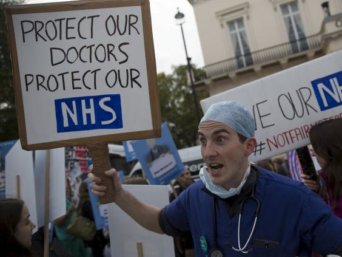- About
- Topics
- Picks
- Audio
- Story
- In-Depth
- Opinion
- News
- Donate
- Signup for our newsletterOur Editors' Best Picks.Send
Read, Debate: Engage.
It's not often you hear of a humanitarian crisis in the UK, but that's precisely how the Red Cross is describing the country's crisis with its National Health Service (NHS). For many around the world, the NHS stands as a model of state-funded healthcare, that provides whatever service a patient may need, without the requirement for additional costs.
However, the ideology which began with the coalition government in 2010, and continued under David Cameron's ill-fated administration, and now Theresa May's, can be described in one word: Austerity.
Austerity is not in itself a terrible idea. It simply means trimming away at public services which are inefficiently run, to be replaced by better and more practical services. For example, the government eliminated funding for many quasi-autonomous-non-governmental-organizations under the terms of austerity: Things like the Audit Commission spending wildly on office furniture were curtailed. That's probably a good thing. However, austerity as an ideology can be disastrous, as it eliminates the idea of the state as protector of citizens. Instead, austerity becomes, quite plainly, the political voice of business.
The Conservative government of the UK has cut investment into the NHS, in particular, with regard to junior doctors. The government sees an opportunity to save on providing full-time contracts for its employees: Instead, junior doctors are being offered less lucrative, but equally demanding work contracts. These contracts, while providing little job security, also stretch the employee to work throughout the week with little rest. In short, these contracts are exploitative.
With the perfect storm of an ageing population, an increased demand on the health service, austerity, and an exploited generation of doctors, patients, as well as junior doctors, become the victims.
Al-Jazeera reports: Speaking to the BBC, Professor Keith Willett, director of acute care for NHS England, disputed the Red Cross description of the situation as a humanitarian crisis.
"On the international scale of a humanitarian crisis, I do not think the NHS is at that point," he said. "Clearly, demand is at the highest level ever. But also our planning is probably more comprehensive than it has ever been.
With the country likely to face a prolonged period of economic and political uncertainty in the next few years, this perfect storm might just become your everyday kind of weather.
